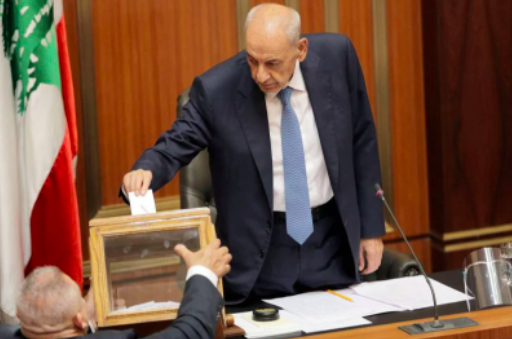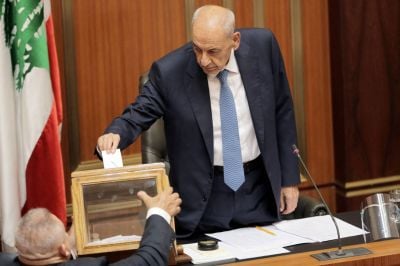
The speaker of the Lebanese Parliament, Nabih Berri, slipping his ballot into the ballot box, on May 31, 2022, during the Parliament's leadership elections in Beirut. (Credit: Lebanese Parliament/REUTERS)
Nabih Berri has the habit of telling the same joke to the foreign diplomats he meets during their visits to Lebanon.
“Let me explain to you how things are done in Lebanon. In this country, the president must always be a Maronite, the prime minister a Sunni and the speaker must always be... Nabih Berri,” he quips.
The head of Parliament is known for his brand of humor. But beyond the joke, which has varied appeal to his interlocutors, Berri’s remark carries a deep political significance.
In fact, it reflects the Shiite political context in the country and the modus operandi of the Lebanese.
At the Shiite level, while the Amal Movement leader considers himself extremely indispensable and must always be reelected to his post as head of the legislature, he is not the only one in his community to think the same.
This is because his political tenure is essentially the result of some sort of “a peace treaty” signed in the Syrian capital of Damascus in November 1990 — a time when Syria was consolidating its hegemony over Lebanon.
The Damascus agreement, concluded between the Syrian government, Iran, Hezbollah and Amal, put an end to the bloody conflict that had pitted the two Shiite militias against each other in the last years of the Lebanese 1975-90 Civil War.
Generally speaking, the agreement consecrated the Syrian-Iranian alliance in the land of the cedars, clearly distributing roles and prerogatives between the two sides.
Hezbollah, which emerged victorious from the war, was tasked with all matters related to operations on the ground, and the privilege of keeping its heavy arsenal, while granting Iran a virtual border with Israel, rendering Tehran a major player on the Middle Eastern scene.
Meanwhile, Amal was tasked with infiltrating the Lebanese political institutions and given free rein to milk the cash cow that the Lebanese state was supposed to become again.
Thirty-two years later, circumstances have certainly changed a lot.
Israel withdrew from the South. Syrian hegemony over Lebanon came to an end. Hezbollah has progressively become “more Lebanese” — in the sense that its operatives pointed their guns at their countrymen when they seized control of parts of the Lebanese capital in May 2008. The political governance has collapsed, and the cow has dried up.
Yet, the Damascus agreement still stands, for lack of an intra-Shiite alternative and a global solution to the multiform crisis plaguing the country.
This explains Berri’s tenure in Parliament despite the occasional false concerns of competition from pseudo rivals from the intelligence apparatus, such as Jamil Sayed and Abbas Ibrahim.
What’s more, Berri considers himself indispensable because he is somehow the centerpiece of the Lebanese political chessboard, making him an essential piece in the game.
In its very collapse, Lebanese governance continues to depend on a sort of chaos mechanism of which Berri remains the main cog.
And this is not because, as it is too often said, he is smarter than the others or that he has mastered the art of compromise better than anyone else, but rather because he is ideally situated at the crossroads of Hezbollah and the other Lebanese players — a position that gives him good leeway to be the one who finds solutions.
This is all the more because he understands the rules of the game and assumes responsibility, and is aware of implications better than others.
In the wake of the Doha conference in May 2008, which instilled the principle of consensus at the expense of the republic’s laws, Berri assured anyone who would listen that from then on, a “bad agreement” between the Lebanese was better than “the best of laws.”
This is how Lebanon has been governed for years.
The difference between Berri and others, at least some others, is that the latter always claim to abide by the constitution.
Thirty years in office
As Parliament speaker since 1992, Berri is both the highest representative of the Shiite community in the state and a stooge for the powerful Hezbollah.
From the very beginning, he was hardly an extremist, although his political career was launched at the same time of the Islamic Revolution in Iran in 1978-79.
Berri was born in 1939 in Sierra Leone, where his father had set up a relatively successful business, as did many Lebanese Shiite who emigrated to Africa in a bid to escape poverty in their homeland.
As a young lawyer in the 1960s and 70s, Berri embodied the desire for social, economic and political development that was sorely lacking in his “deprived” religious community.
In 1980, he took over the leadership of the Amal Movement that was created by Imam Moussa Sadr, the spiritual leader of the Lebanese Shiites, before the latter’s disappearance in Libya.
Far from wanting to establish an Iranian-style Islamic Republic in Lebanon, Berri was essentially campaigning to grant the Shiite community a more influential position within the political system and the economic establishment.
As a leader of an armed militia, he got caught in the quagmire of the civil war, which propelled his political career.
He held various ministerial positions from 1984 onwards and opened the doors of the administration to his peers, cronies and co-religionists.
His reputation as a skillful maneuverer grew. At the same time, however, he placed himself under the Syrian regime’s thumb and became its main ally in Lebanon.
From 1990, the “Pax Syriana” was imposed on Lebanon. From then on, Berri could access the highest levers of power. Parliament became his “thing.”
In 2005, the Syrian army was forced to withdraw from the country. Berri’s career could have ended at this point. However, he would be re-elected to his position a few months later, and again in 2009, then in 2018 and finally in 2022.
It is because Hezbollah needs him to act as its “presentable” showcase.
Berri is certainly irreplaceable. But this unending tenure is precisely one of the facets of the Lebanese crisis, a testament to its magnitude.
Today, the protest movement forces that have entered Parliament, as well as the traditional opposition groups who have increased their presence there, can legitimately say “no” to a new mandate for Berri.
But at this stage, they are unable to unseat him. In order to achieve change, they will first have to create the conditions for that change.
That is what they were elected to do.
This article was originally published in French in L'Orient-Le Jour. Translation by Sahar Goussoub.
